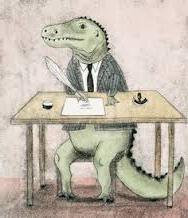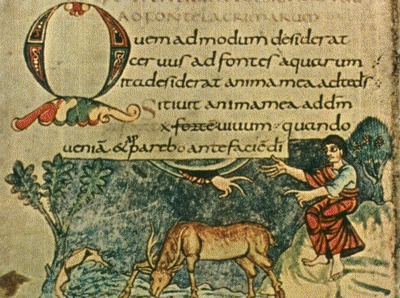Here The Muse Of Language Arts undertakes a somewhat hazardous act: the Muse
attempts to identify fiction
writers who exemplify what it means to be creative and who have achieved greatness
for it.
The Muse also offers suggestions for equipping oneself to recognize great
creative writing when it's read, an ability not easy to cultivate.
The Muse's goal is hazardous partly because it's controversial. It's controversial because so many
others who attempt these goals harbor sharply differing opinions about what
attributes make for great creative writing and about what writers attain and
demonstrate these attributes. To a large extent, conclusions like these are
based on personal judgments, and personal judgments
of this kind often differ markedly.
Nonetheless, The Muse undertakes these perilous goals because writers
like these merit all the recognition they're entitled to. They are the best of the best,
the crème de la crème; and also because readers who are equipped to
understand the nature of great creative writing are better positioned to
recognize great creative writing; and they profit most from reading it.
For this analysis, The Muse considers recent fictional authors only,
contemporary or expired writers from the last one hundred and fifty or so
years.
what is creative writing?
That's a picture of great creative writing at the left.
Creative writers are people who write creatively and who produce creative
writing.
To write creatively—To write a creative
literary work is to evolve from one's own thought or imagination original
ideas or insights, subjects, modes of expression, or points of view; it's
to devise and apply new and different literary concepts, features, or
techniques. Writing creatively is to depart from the commonplace and
mundane and to put words on paper like they've never been put before.
Creative writing—From a procedural point of view, creative writing is writing that
expresses an author's creative imagination and originality of thought or expression.
Writing creatively is the process or act of setting down text that results
in literary works that exhibit creativity.
- Explore the nature of creative writing and the creative writing process at greater
length. Visit The Muse Of Language Arts feature titled Welcome To The
World Of Creative Writing: tap or
click here.
Creativity vs. Greatness—two different things
The Muse takes the "learn by example" route because considering examples of
and their works are one of the best ways to clarify what it means to be creative.
The first step along this route is to form a clear idea of the difference
between creativity and greatness, for they are not the same thing. Not all
writers who are creative are great, and not all writers who are
great are greatly creative. Moreover:
- many writers perfect themselves or fade throughout their careers.
- both creativity and greatness are ephemeral.
- one work from the same author may succeed while another fails
- some sections of a given work may manifest creativity and/or greatness
while others do not
- public and critical reception can be transitory
What does it mean to write creatively?
To write creatively is to evolve from one's own thought or imagination original
ideas or insights, subjects, modes of expression, or points of view; it's
to devise and apply new and different literary concepts, features, forms,
methods, models, mental constructs, solutions, or techniques.
Writing creatively is to depart from the commonplace
and mundane and to put words on paper like they've never been put before.
To be creative is to transcend traditional ideas, rules, patterns,
relationships, or the like, and to create meaningful new ideas; it's
originality, progressiveness, and applied imagination.
What does it mean to be great?
To be great, a writer must possess some combination of these qualities.
He or she must be:
- notable, remarkable, exceptionally outstanding or important
- highly significant or consequential
- distinguished or famous or successful
- of high rank, official position, or social standing
- in possession of extraordinary powers
- of unusual merit
- very admirable, appreciated, and excepted
- a writer who has achieved importance or distinction
- notable or imposing
- famous
To be both great and creative is to combine both these qualities in a single author
or work.
polishing your concept of great creative writing—an
approach
At the right, a picture of a creative writer polishing his concept of
great creative writing.
Where writing is concerned, sometimes the concepts of creativity and
greatness become muddled with one another. Often that happens because some
wonderful, first-rate creative writers become great, or at least for a while
they circulate on the fringes of greatness for a time in the eyes of their
cliques, coteries, and other followers.
But in fact, creative writing is not always the same as great writing,
and great writing is not always the same as creative writing. And this
distinction holds for authors, as well as their works.
Commonsense and practical experience hold that it pays to keep these two
notions of creativity and greatness separate from one another—that
it's worthwhile to polish, perfect, and train oneself to keep clearly
in mind at all times that these two ideas are not identical. Otherwise there
is danger that the illusion of greatness will foster and promote the
illusion of great writing, and vice versa.
Here The Muse offers an approach that will help keep this distinction
alive in your mind's eye when you are reading, analyzing, or critiquing
creative authors and their writing. Polishing like this is especially
worthwhile if the author you are critiquing is you.
The approach
Below is a partial list of some of the world's most creative and greatest
writers. In the Muse's opinion it contains the names of only extraordinarily creative writers.
Writers like these are so rare, only a handful of them are justly referred
to as extraordinarily creative; only a few are
truly great.
Each of the authors on the list was (or is) a paragon of creativity. All
demonstrated an ineluctably high level of creative skill which is
incontestable. At least for a time, each produced superbly consummate
creative works; each possessed a knack for writing that was inherent in his
genes.
In some cases, skills were slowly gained, completely lost, or they faded
with time and age; unfortunate circumstances may have intervened, or
lifestyles may have become undermining. For others, once found greatness
later was lost as audience tastes or loyalties shifted. But for all, in
their time and for a time, they triumphed.
The practice
The Muse suggests you start to explore great creativity by reviewing
this list. As you scan,
don't be mislead by the creative specialties, strengths, or fields that are
cited for an author.
Their personalities and achievements are/were too deep and broad in scope
to be bottled up and classified narrowly, but these specialties give a general idea
that will get you started thinking about them.
As you review the list, develop your own ideas about the personality
characteristics and life circumstances of each author; ponder their human
traits and the nature of their greatness; evaluate their works and the
characteristics that make them creative.
Then choose a name or two or three to investigate further. Dig deeper
into these lives and their cultural surroundings. The more you know about
them and their lives and surroundings,
the more you will be able to draw your own conclusions.
To help expand your concept of creativity and greatness, read
representative sample works for your choices and analyze them from literary
and historic points of view; more fully evaluate their creative
contributions. You may also want to see movies based on these authors'
works, especially movies for which the author is the sole screen writer or
has collaborated on the screenplay, if any are extant.
Hopefully your exploration will generate specific notions that will help
refine your concept of what it means to be creatively great.
about this list
By no means is this list exhaustive; easily, more writers could be
added. But for clarity The Muse has elected to focus on a relatively small
number of names.
The names on this list are arranged in no special order. The Muse chose
these authors over others because they are recent; that way, it's
more likely that you are familiar with them and at least a few of their
works. And they're few enough in number for you to more conveniently
explore their lives and work in depth.
great creative writers
| Name |
Creative Specialty, Strength, Or
Field |
| James Joyce |
writing style |
| William Shakespeare |
playwriting, expressiveness, composing sonnets |
| Charles Dickens |
characterization |
| Theodore Seuss Geisel (Dr. Seuss) |
children's literature; writing style and graphic
illustration |
| Terry Pratchett |
satire; fantasy |
| Jules Verne |
plot ideas; technical topics |
| Luis Jorge Borges |
philosophical essay; thoughtful weirdness |
| Charles Dodgson (Lewis Carroll) |
whimsy |
| Edgar Allen Poe |
horror |
| Edgar Rice Burroughs |
situations |
| William Faulkner |
settings; writing style |
| Anatol France |
satire |
| Fyodor Dostoevsky |
psychological workings of the mind and heart |
| Franz Kafka |
bizarre imaginings; personality disruption |
| Frank Baum |
children's adventure literature |
| Samuel Beckett |
philosophical and existential playwriting |
| Emily Dickenson |
poetry |
| Bram Stoker |
modern vampire legend (Count Dracula) |
develop your initial impressions further
At the right, see a reader who loves great creative writing being rewarded in
kind by a great creative work written by a great creative writer. Wow!
The Muse suggests a few things to consider when evaluating the writers
named on this list:
- Don't confuse literary greatness or brilliance with literary creativity.
Some great (and even some mediocre) authors excel in creativity. Conversely, not all highly creative authors attain greatness; some
barely achieve adequacy. For example, Charles Dickens is a great author who is extraordinarily
creative. Leo Tolstoy is a great, great author who is not especially creative.
Edgar Rice Burroughs is a creative author who wrote at a barely
adequate skill level.
-
 Some of the authors on this list were extraordinarily creative at the
time they wrote, but today their inspiration may seem to have lost some of
its glimmer and brilliance.
Some of the authors on this list were extraordinarily creative at the
time they wrote, but today their inspiration may seem to have lost some of
its glimmer and brilliance.
- Today some readers value older writers less than current or recent
ones; they seem stale
or old fashioned to them because times have changed. In truth, contributions
by older creative authors are no less creative, unique,
or spectacular today than they were at the time they originally occurred. Temporal
diminishments dim their creativity not a whit.
- Some of the innovators on the list may seem unexceptional when their work is
compared with that of other authors. But actually, their innovations were
so novel and distinguished at the time they wrote that they were adopted by
other authors and became enduring standards. Ironically, in cases like
these, authors were so extraordinarily creative their inventions may seem
to have
become commonplace.
- Please don't assume that this list does not include non-fiction
writers because non-fiction writers are more creative. Treating fiction
this way is more conducive to the goal of explaining creativity than
treating non-fiction.
- William Shakespeare demonstrates that a writer doesn't have to excel in
every aspect of writing to be extraordinarily creative:
- He is
undoubtedly the greatest playwright who ever
lived and one of the most creative writers in any field.
- His use of language is
unparalleled and his scenes are brilliantly structured.
- But his stories are
not original. With a few possible exceptions, he deliberately chose to copy
his stories from chronicles, classical authors, histories, and other sources. And
more: virtually
every one of his stories was influenced by other kinds of works in one way
or another.
- The English sonnet form was devised by Sir Phillip Sidney by
restructuring the Italian sonnet so that it was
suitable for the English language and so that it would express the kinds of
ideas that English poets wanted to say. But it took Shakespeare to raise
the English sonnet to its highest artistic expression. He employed
Sidney's English sonnet form to create the greatest English sonnets ever
written.
- Shakespeare excelled in many additional ways. His creativity exceeds that of every other writer of his time,
a period noted for brilliant writers and literary innovation.
explore the creative writing process
- Start at the beginning. See the Creative Writing 101 beginner's guide
to creative writing success at the Writer's Treasure web site: tap or click
here.
see:
https://www.google.com/search?sourceid=navclient&aq=&oq=great+creaative+writers&ie=UTF-8&rlz=1T4ADRA_enUS426US426&q=great+creaative+writers&gs_l=hp....0.0.2.997677...........0.ZCcyxFeBZQU
a beginner's guide
best creative writing exercises
link to terrific creative writing blogs
writing tips from the masters
link to the creative writing community
see
explore creative writing domains



 Some of the authors on this list were extraordinarily creative at the
time they wrote, but today their inspiration may seem to have lost some of
its glimmer and brilliance.
Some of the authors on this list were extraordinarily creative at the
time they wrote, but today their inspiration may seem to have lost some of
its glimmer and brilliance.

